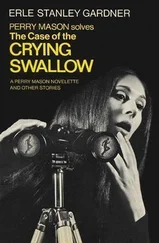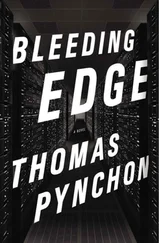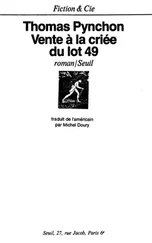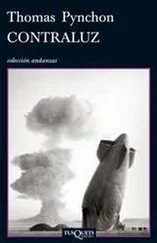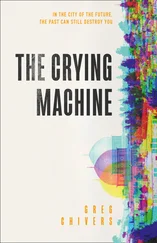At some indefinite passage in night's sonorous score, it also came to her that she would be safe, that something, perhaps only her linearly fading drunkenness, would protect her. The city was hers, as, made up and sleeked so with the customary words and images (cosmopolitan, culture, cable cars) it had not been before: she had safe-passage tonight to its far blood's branchings, be they capillaries too small for more than peering into, or vessels mashed together in shameless municipal hickeys, out on the skin for all but tourists to see. Nothing of the night's could touch her; nothing did. The repetition of symbols was to be enough, without trauma as well perhaps to attenuate it or even jar it altogether loose from her memory. She was meant to remember. She faced that possibility as she might the toy street from a high balcony, roller-coaster ride, feeding-time among the beasts in a zoo-any death-wish that can be consummated by some minimum gesture. She touched the edge of its voluptuous field, knowing it would be lovely beyond dreams simply to submit to it; that not gravity's pull, laws of ballistics, feral ravening, promised more delight. She tested it, shivering: I am meant to remember. Each clue that comes is supposed to have its own clarity, its fine chances for permanence. But then she wondered if the gemlike "clues" were only some kind of compensation. To make up._for~her having lost the direct, epileptic Word, the cry that might abolish the night.
In Golden Gate Park she came on a circle of children in their nightclothes, who told her they were dreaming the gathering. But that the dream was really no different from being awake, because in the mornings when they got up they felt tired, as if they'd been up most of the night. When their mothers thought they were out playing they were really curled in cupboards of neighbors' houses, in platforms up in trees, in secretly-hollowed nests inside hedges, sleeping, making up for these hours. The night was empty of all terror for them, they had inside their circle an imaginary fire, and needed nothing but their own unpenetrated sense of community. They knew about the post horn, but nothing of the chalked game Oedipa had seen on the sidewalk. You used only one image and it was a jump-rope game, a little girl explained: you stepped alternately in the loop, the bell, and the mute, while your girlfriend sang:
Tristoe, Tristoe, one, two, three, Turning taxi from across the sea… "Thurn and Taxis, you mean?" They'd never heard it that way. Went on warming their hands at an invisible fire. Oedipa, to retaliate, stopped believing in them.
In an all-night Mexican greasy spoon off 24th, she found a piece of her past, in the form of one Jesus Arrabal, who was sitting in a corner under the TV set, idly stirring his bowl of opaque soup with the foot of a chicken. "Hey," he greeted Oedipa, "you were the lady in Mazatlan." He beckoned her to sit.
"You remember everything," Oedipa said, "Jesus; even tourists. How is your CIA?" Standing not for the agency you think, but for a clandestine Mexican outfit known as the Conjuration de los Insurgentes Anarquis-tas, traceable back to the time of the Flores Mag6n brothers and later briefly allied with Zapata.
"You see. In exile," waving his arm around at the place. He was part-owner here with a yucateco who still believed in the Revolution. Their Revolution. "And you. Are you still with that gringo who spent too much money on you? The oligarchist, the miracle?" "He died."
"Ah, pobrecito." They had met Jesus Arrabal on the beach, where he had previously announced an anti-government rally. Nobody had showed up. So he fell to talking to Inverarity, the enemy he must, to be true to his faith, learn. Pierce, because of his neutral manners when in the presence of ill-will, had nothing to tell Arrabal; he played the rich, obnoxious gringo so perfectly that Oedipa had seen gooseflesh come up along the anarchist's forearms, due to no Pacific sea-breeze. Soon as Pierce went off to sport in the surf, Arrabal asked her if he was real, or a spy, or making fun of him. Oedipa didn't understand.
"Yon know what a miracle is. Not what Bakunin said. But another world's intrusion into this one. Most of the time we coexist peacefully, but when we do touch there's cataclysm. Like the church we hate, anarchists also believe in another world. Where revolutions break out spontaneous and leaderless, and the soul's talent for consensus allows the masses to work together without effort, automatic as the body itself. And yet, sena, if any of it should ever really happen that perfectly, I would also have to cry miracle. An anarchist miracle. Like your friend. He is too exactly and without flaw the thing we fight. In Mexico the privilegiado is always, to a finite percentage, redeemed -one of the people. Unmiraculous. But your friend, unless he's joking, is as terrifying to me as a Virgin appearing to an Indian."
In the years intervening Oedipa had remembered Jesus because he'd seen that about Pierce and she hadn't. As if he were, in some unsexual way, competition. Now, drinking thick lukewarm coffee from a clay pot on the back burner of the yucateco's stove and listening to Jesus talk conspiracy, she wondered if, without the miracle of Pierce to reassure him, Jesus might not have quit his CIA eventually and gone over like everybody else to the majority priistas, and so never had to go into exile.
The dead man, like Maxwell's Demon, was the linking feature in a coincidence. Without him neither she nor Jesus would be exactly here, exactly now. It was enough, a coded warning. What, tonight, was chance? So her eyes did fall presently onto an ancient rolled copy of the anarcho-syndicalist paper Regeneracion. The date was 1904 and there was no stamp next to the cancellation, only the handstruck image of the post horn.
"They arrive," said Arrabal. "Have they been in the mails that long? Has my name been substituted for that of a member who's died? Has it really taken sixty years? Is it a reprint? Idle questions, I am a footsoldier. The higher levels have their reasons." She carried this thought back out into the night with her.
Down at the city beach, long after the pizza stands and rides had closed, she walked unmolested through a drifting, dreamy cloud of delinquents in summer-weight gang jackets with the post horn stitched on in thread that looked pure silver in what moonlight there was. They had all been smoking, snuffing or injecting something, and perhaps did not see her at all.
Riding among an exhausted busful of Negroes going on to graveyard shifts all over the city, she saw scratched on the back of a seat, shining for her in the brilliant smoky interior, the post horn with the legend DEATH. But unlike WASTE, somebody had troubled to write in, in pencil: DON'T EVER ANTAGONIZE THE HORN. Somewhere near Fillmore she found the symbol tacked to the bulletin board of a laundromat, among other scraps of paper offering cheap ironing and baby sitters. If you know what this means, the note said, you know where to find out more. Around her the odor of chlorine bleach rose heavenward, like an incense. Machines chugged and sloshed fiercely. Except for Oedipa the place was deserted, and the fluorescent bulbs seemed to shriek whiteness, to which everything their light touched was dedicated. It was a Negro neighborhood. Was The Horn so dedicated? Would it Antagonize The Horn to ask? Who could she ask?
In the buses all night she listened to transistor radios playing songs in the lower stretches of the Top 200, that would never become popular, whose melodies and lyrics would perish as if they had never been sung. A Mexican girl, trying to hear one of these through snarling static from the bus's motor, hummed along as if she would remember it always, tracing post horns and hearts with a fingernail, in the haze of her breath on the window.
Читать дальше


